How Gary Lineker went from football sensation to headline-hitting presenter
Helen Bushby
Culture reporter
Gary Lineker, who will leave the BBC after hosting his final Match of the Day on Sunday, was the steady hand who guided millions of fans through football’s agonies and ecstasies.
As the face of the corporation’s flagship football show for 26 years, he was also one of the its highest-profile presenters, earning £1.3 million in 2023.
But last November’s agreement between Lineker and the BBC that he’d stop hosting Match of the Day, but continue to front the FA Cup and World Cup into 2026, is in tatters.
It follows last week’s controversy when he shared a social media post about Zionism that included an illustration of a rat, historically used as an antisemitic insult.
He immediately deleted it after criticism, saying he was unaware of the image’s symbolism, and later said he “apologised unreservedly”.
But the ensuing headlines will not be the ones Lineker will have wanted or anticipated for his final weeks working at the BBC – he’d worked hard for years to build up his reputation as a stellar broadcaster.
His one-line pay-offs at the end of each show, summing up both the fans’ mood and the match, may have looked seamless.
But they were the result of years of honing his craft after his successful football career.

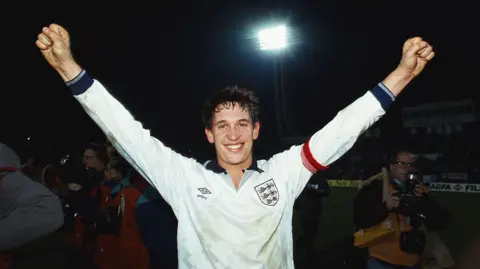 Getty Images
Getty Images
As a former footballer of considerable pedigree – including England captain and striker, with 48 goals in 80 appearances – he famously never received a red or yellow card during his career.
His ability to keep his cool on the pitch stood him in good stead for a career in live broadcasting when he retired as a player in 1994.
Even while he was still at school, he had his sights set on sports journalism, deciding it would be his fall-back if football didn’t work out.
Clearly it did.
Known for his ability to find gaps in the opposition’s defence, and his “poacher’s instinct” , Lineker was the 1986 World Cup Golden Boot winner, and the top goal-scorer in England three times, each with a different club: Leicester City, Everton and Tottenham Hotspur.
But while his sports career was at its peak at the 1986 and 1990 World Cup finals, Lineker spent time with journalists staying in the same hotel as the England team.
“As early as my mid-20s, I knew which direction I wanted to go in when I retired from playing,” he told the BBC in 2014.
“I would watch the newspaper guys write their opening paragraphs and sit with the radio journalists and talk to them about how they did their job.”
His ultimate aim was to end up as the presenter rather than a pundit.
But he admitted his transition into radio and TV “took a lot of work”.

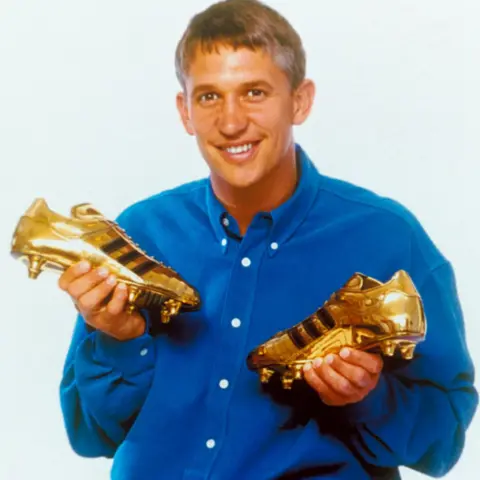
His early broadcasting attempts were “fairly appalling”, he told BBC Radio 4’s Media Show in 2021.
Starting out on Radio 5 Live “was all part of the learning process”.
“I managed to stumble my way through it, and I learned from really good people alongside me who were incredibly helpful in the early days.”
Lineker built on that experience, writing all his own scripts and carving out a role for himself.
Having watched ex-sports stars David Gower presenting the cricket and Sue Barker fronting the tennis, he questioned why it wasn’t the same in football.
“I just thought, as a player who’s played right at the top, if I could crack presenting it would give me a niche,” he told BBC Radio 4 podcast Don’t Tell Me the Score in 2019.
“It would give me an advantage over all the others.”
Meanwhile, his popularity as a footballer endured. In 1991, Arthur Smith and Chris England wrote a stage play called An Evening With Gary Lineker, about a couple trying to rekindle their marriage during the 1990 World Cup semi-final.
Starring Caroline Quentin, Clive Owen, Paul Merton and Martin Clunes, it was filmed for TV in 1994 – with Lineker making a cameo appearance.

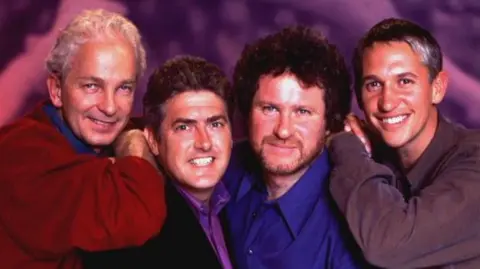
He also began building his wider TV career, appearing as a team captain on BBC One’s comedy panel show, They Think It’s All Over, from 1995 to 2003.
As a presenter, he got himself noticed when he stood in for Des Lynam on the Saturday afternoon sports show Grandstand, in 1997.
By the mid-90s, Lineker was also appearing on Match of the Day as a pundit.
This gave him a prime learning spot – right next to its experienced and slick host Lynam.
“Des was very helpful – I used to ask a lot of questions about the little things that he did, and picked up some of his nuances,” the former footballer said.
“He told me to be brave occasionally with closing lines, and not to be afraid to try to be amusing.
“Again, the little pay-offs I sometimes make at the end of the show are something that came from him.”

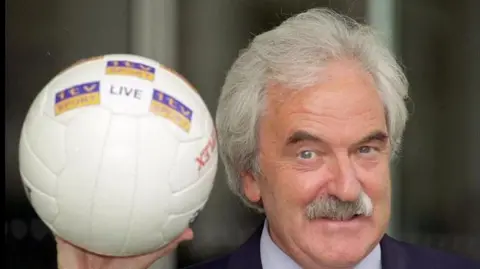 PA Media
PA Media
By 1999, Lineker was hosting the show, and reaching audiences the BBC sometimes struggled to attract and retain.
People would also tune in to see his chemistry with the show’s pundits – including other former footballers such as Alan Shearer, Ian Wright, Micah Richards and Alan Hansen.
Lineker’s questions kept the analysis flowing, while he was always willing to share a joke and opinion of his own.
He also memorably introduced the show in his pants in 2016, having pledged to “do the first MOTD of next season in just my undies” if his former club Leicester won the Premier League, which they did.
Shearer and Wright couldn’t keep straight faces.
Their friendships often shone through. In June last year, Lineker and Shearer sent an emotional message of support to Hansen, after hearing the news that he was seriously ill in hospital.

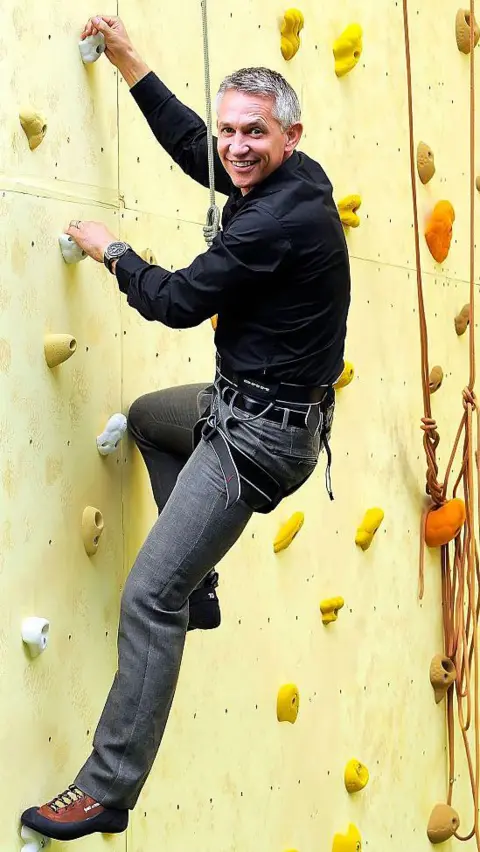 Getty Images
Getty Images
But despite his rapport with his colleagues, off-screen matters were not as straightforward.
As one of the BBC’s highest-paid presenters, regularly topping the list of the staff whose salaries are declared, he faced constant scrutiny.
Lineker did not shy away from speaking out about his own views, particularly on social media, while simultaneously working for a broadcaster committed to impartiality.
In March 2023, he posted on X about the government’s asylum policy – resulting in the BBC briefly suspending him.
Shearer, Wright and other BBC sport presenters refused to appear on air, in protest at his absence.
Match of the Day was reduced to a 20-minute edition minus its host, pundits and commentary – and the story made headline news for several days, with politicians and media commentators all weighing in on the issue.
Mr Davie subsequently apologised to licence fee payers for the disruption, calling it a “difficult day” for the corporation.
Lineker was reinstated nine days later.
The presenter later said the response to his tweet was “silly – it shouldn’t have been”.
“I love the BBC. I’ve been there for nearly 30 years but people make mistakes, they recognise that and they addressed it and in the end, thankfully, we’re all back to work,” he said.

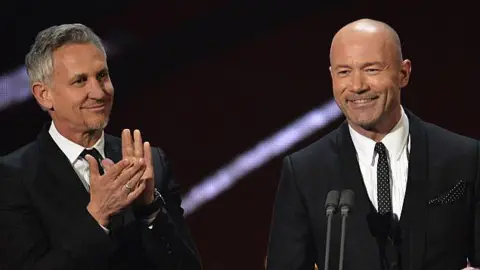 Getty Images
Getty Images
The incident prompted a review of BBC social media guidelines. Last September, new rules were published for BBC flagship presenters, saying they should be allowed to express views on issues and policies, but stop short of political campaigning.
Lineker said the recommendations were “all very sensible”.
By February last year, he said he was using X less often, saying the platform had become “increasingly toxic” under its new owner, Elon Musk.
In February 2025, Lineker made headlines when he was among 500 other high-profile figures who signed an open letter urging the BBC to reinstate a documentary, Gaza: How to Survive a War Zone, to BBC iPlayer.
The documentary was pulled from the streaming service in February after it emerged its 13-year-old narrator was the son of a Hamas official.
After concerns were raised, the BBC took down the film while it carried out further due diligence. The corporation has apologised and admitted “serious flaws” in the making of the film and the matter is still subject to an internal investigation.
Last month, Lineker spoke to BBC presenter Amol Rajan, and was asked about the comments he posted on social media in March 2023.
Lineker said he did not regret taking the position he did, but that he would not do it again because of the “damage” it did to the BBC.
However it appears that the latest round of headlines about the sports presenter made his position untenable.
Despite his BBC career being cut even shorter, Lineker has plenty of outside business interests, including the successful podcast production company he co-founded, called Goalhanger.
It produces shows including The Rest Is History, The Rest Is Entertainment and The Rest Is Politics, which won the Champion prize at last year’s Podcast Awards.
At the recent Arias radio awards, Goalhanger was named audio brand of the year.
The Rest is Football podcast, featuring Lineker, Alan Shearer and Micah Richards, is also on BBC Sounds.
Lineker will be replaced on Match of the Day by Kelly Cates, Mark Chapman and Gabby Logan for the start of the 2025-26 season.
He indicated to Rajan his next career move “won’t be more telly”, adding: “I think I’ll step back from that now” and “I think I’ll probably focus more on the podcast world”.
It will be interesting to see if he takes up any potential offers from rival broadcast outlets, or if he really has stepped back from TV for good.







